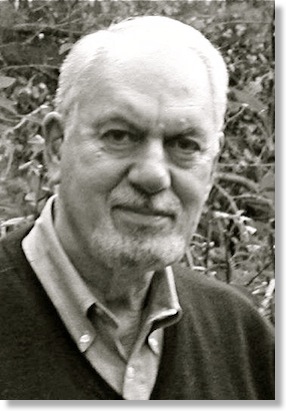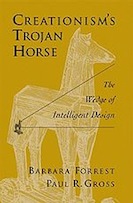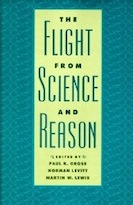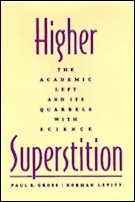
Paul R. Gross, PhD, ScD
Fellow
University of Virginia, USA
Paul R. Gross, PhD, ScD, is known for his extensive writings on science in culture. With Norman Levitt, he wrote Higher Superstition: The Academic Left and its Quarrels With Science (Johns Hopkins University Press, 1994, re-issued and updated in 1998). That book exposed then-regnant postmodern and other academic follies in cultural and science studies, as well as the widespread and increasing politicization of science. With Levitt and Martin W. Lewis, he organized a major conference at the New York Academy of Sciences and edited its volume of proceedings: The Flight From Science and Reason (Annals of the New York Academy of Sciences, 1996, and the Johns Hopkins University Press 1997). Creationism’s Trojan Horse: The Wedge of Intelligent Design (Oxford University Press, 2004; reissued with update in 2007) is a book by Gross and Barbara Forrest that first brought to public attention, including that of scientists, the history, content, and scientific pretensions of the “Intelligent Design” creationist movement.
Dr Gross is University Professor of Life Sciences, emeritus, University of Virginia. His AB and PhD degrees (zoology, general physiology) are from the University of Pennsylvania. He holds honorary degrees from Brown University and the Medical College of Ohio; and he is a Fellow of the American Academy of Arts and Sciences. He has taught at New York University, Brown University, the University of Rochester, Massachusetts Institute of Technology, and the University of Virginia.
At Rochester, Dr Gross was chairman of Biology and Dean of Graduate Studies; at MIT he directed the NIH Training program in cell and developmental biology. From 1978 to 1988, he was Director and President of the Marine Biological Laboratory, Woods Hole, Massachusetts. He served as Vice President and Provost of the University of Virginia, later as director of its Center for Advanced Studies, of the Markey Center for Cell Signaling, and of the Molecular Biology Institute. He has been a Trustee of Associated Universities, Inc., and of the American Academy for Liberal Education, also serving the latter as its Treasurer.
Dr Gross’s research and writing have been primarily in developmental and molecular biology, with special interest in maternal molecular information laid down in the ovum, which directs crucial processes in early development and morphogenesis.
Selected Books:
Creationism’s Trojan Horse: The Wedge of Intelligent Design, with Barbara C. Forrest (Oxford University Press, 2004). On the origins of intelligent design, specifically the Discovery Institute’s Center for the Renewal of Science and Culture and its “wedge” strategy. this book is highly critical of what it refers to as intelligent design creationism. The authors document the Intelligent Design movement’s origins and funding in fundamentalist Christianity in America.
The Flight from Science and Reason, editor, with Norman Levitt and Martin W. Lewis (New York Association for Science, 1997). The 41 authors of 43 essays take on critics of science whose views range from moderate to extreme, from social constructivists to deconstructionists, from creationists and feminists to Afro-centrists. They discuss the rise of “alternative medicine” and explain why the “uncertainty principle” does not work as a metaphor for ambiguity. Throughout, they grapple with the paradox inherent in arguing with opponents who contend that reason itself — and thus, logic — is suspect. Contributors include ISM Fellows WI Sampson and FC Crews, and Dr Gross provides the Introduction.
Higher Superstition: The Academic Left and Its Quarrels with Science, with Norman Levitt (Johns Hopkins University Press, 1994). This book has been at the center of debate about the growing influence of “cultural studies” and the blurring of once-clear academic boundaries. As literary theorists deconstruct scientific “texts” and feminists condemn scientific “patriarchy,” the authors argue principles and practices that underlie 300 years of scientific achievement and have come under attack from scholars with little actual knowledge of science. They warn about the long-term consequences of these trends. The book reportedly was the inspiration for the Sokal Hoax.
Selected Writings:
- “The state of state science standards 2005” (with U Goodenough, LS Lerner, S Haack, M Schwartz, R Schwartz & CE Finn), Thomas B. Fordham Institute, 2005 Dec 7.
- “Science standards: we can’t afford to go light,” National Review Online, 2005 Nov 16.
- “Less than proficient: a review of the draft science framework for the 2009 National Assessment of Educational Progress” (with LS Lerner, S Haack, M Schwartz & R Schwartz), Thomas B. Fordham Foundation, 2005 Oct 24.
- “Berlinski vanquishes pseudoscience and science — again,” TalkReason, 2002 Dec 16.
- “The apotheosis of Stephen Jay Gould,” New Criterion, 2002 Oct.
- “Exorcising sociobiology,” New Criterion, Foundation for Cultural Review, 2001 Feb 1.
- “Does race exist?” New Criterion, Foundation for Cultural Review, 2000 Oct. [excerpt]
- “Politicizing science education,” The Thomas B. Fordham Foundation, 2000 Apr.
- “The Icarian impulse,” The Wilson Quarterly, 1998 Winter; 22(1):39-49.
- “Evidence-Free forensics and enemies of objectivity,” in Noretta Koertge, ed., A House Built on Sand: Exposing Postmodernist Myths About Science (Oxford University Press, 1998):59-70. [abstract] [extract] [DOI]
- “The truth about calcium,” MBL Science, 1986 Winter.
- “Parasites and morals,” MBL Science, 1985 Summer.
In the News:
- “E.O. Wilson,” Bill Moyers Journal, PBS, 2007 Jul 6.
- “A report from the front of the ‘Science Wars’: The controversy over the book Higher Superstition, by Gross and Levitt and the recent articles by Sokal, “ by Evans M. Harrell II, Notices of the American Mathematical Society, 1996 Oct; 40(10):1132-1136.
The Online Paul R. Gross:








